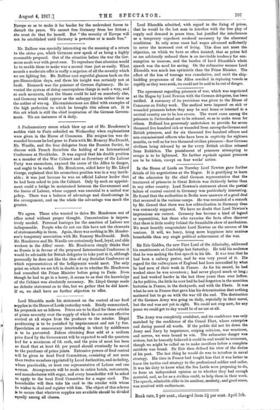Lord Rhondda admitted, with regard to the fixing of prices,
that be would be the last man to interfere with the free play of supply and demand in peace time, but justified the interference as a temporary expedient rendered necessary by the abnormal conditions. In only some cases had wages advanced sufficiently to cover the increased cost of living. This does not meet the objection, on which we have an often insisted, that as prices fall or are arbitrarily reduced there is an inevitable tendency for con- sumption to increase, and the burden of Lord Rhondda's whole speech was the need for saving. On the submarine menace Lord Rhondda was much less optimistic than the Prime Minister. The effect of the loss of tonnage was cumulative, and until the ship- building programme of the Allies resulted in replacing vessels as rapidly as they were sunk, we could not be said to be out of danger.


























 Previous page
Previous page